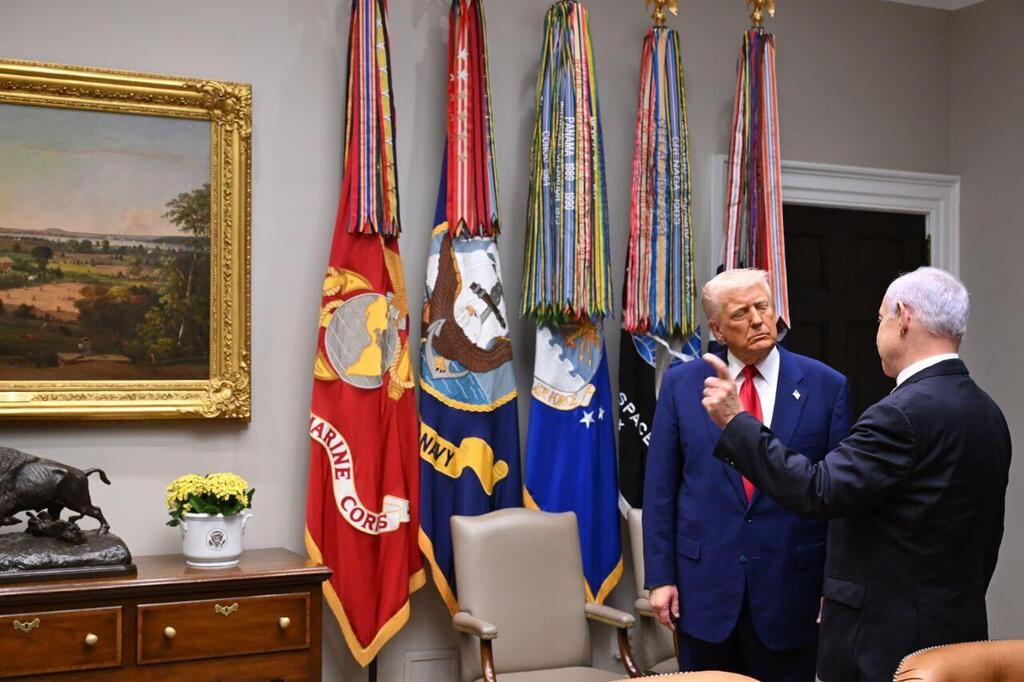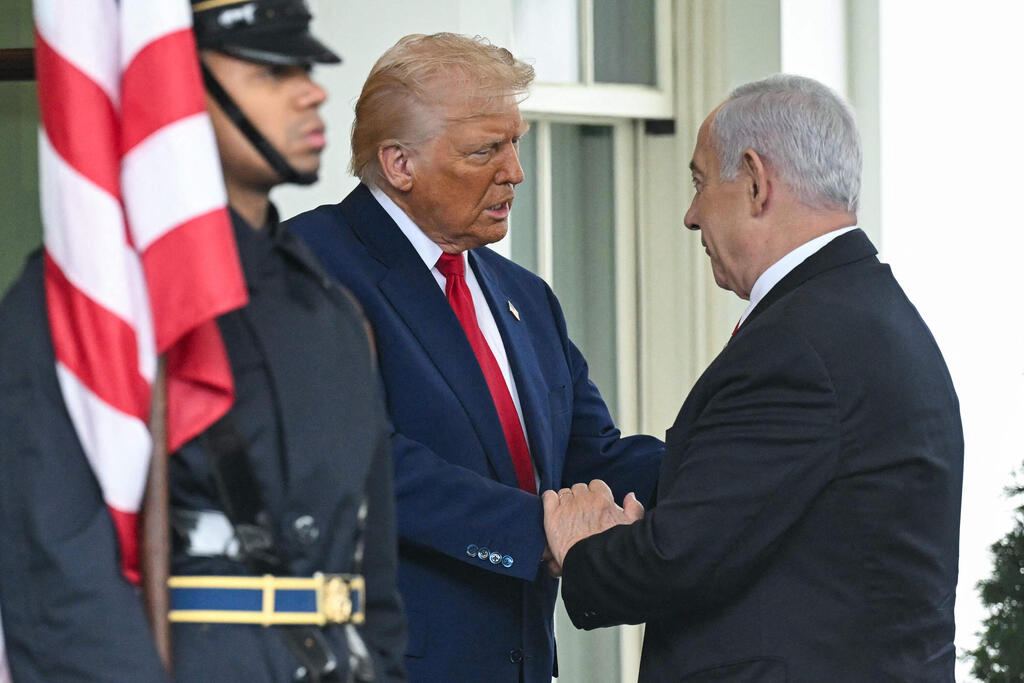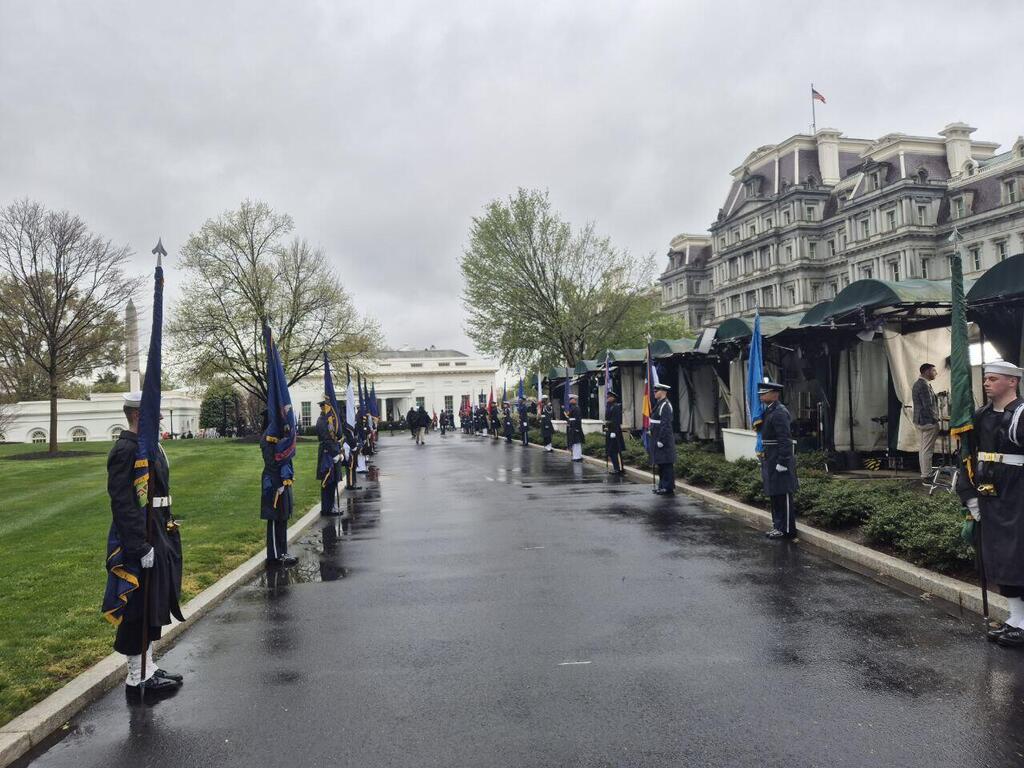Getting your Trinity Audio player ready...
U.S. President Donald Trump said Monday he held a “great discussion” with Prime Minister Benjamin Netanyahu at the White House, focusing on the Iranian threat, the war in Gaza and growing economic tensions over trade.
Trump confirmed that the United States has initiated direct negotiations with Iran, calling the current situation “dangerous territory” but stressing his preference for diplomacy. “We are having direct talks with Iran. They have started, and they’ll go on Saturday,” Trump said. He described the upcoming session as a “very big meeting,” adding, “Maybe a deal will be made.”
6 View gallery


Prime Minister Benjamin Netanyahu and US President Donald Trump
(Photo: SAUL LOEB / AFP)
Trump also said he believed the war in Gaza would “stop in the not too distant future,” as efforts continue behind the scenes to reach a broader resolution. Netanyahu said the two leaders were “working on another deal” for the release of hostages and reiterated that “the people of Gaza should have the choice to go wherever,” though he did not elaborate on the details or destination of any potential relocation initiative. Trump suggested a more assertive approach, saying, “Controlling and owning Gaza Strip would be a good thing.
Trade tensions between the allies were also addressed in the meeting. Netanyahu said Israel is committed to eliminating its trade deficit with the United States and removing barriers. “I spoke to [U.S. Commerce Secretary Howard] Lutnick yesterday,” Netanyahu said.
Prime Minister Benjamin Netanyahu arrives at the White House for a summit with US President Donald Trump
(Video: Reuters)
Trump also indicated a broader shift in economic policy, saying, “We are talking about a whole new trade with Israel,” though he did not provide further details on what changes might be introduced.
The leaders also discussed the situation in Syria, with Netanyahu raising concerns about Turkey’s increasing presence in Israel's neighbor to the north. “We don’t want Syria to be used by Turkey,” he said, adding that both sides reviewed ways to prevent further conflict in the region.
Trump said that he maintains a strong personal relationship with Turkish President Recep Tayyip Erdoğan and dismissed any tensions between the two nations. “I have a great relationship with President Erdoğan. I like him, and we have no problem,” he said, promising to mediate between the two U.S. allies. “If you have a problem with Turkey — we’ll solve it,” Trump told the Israeli leader.
A scheduled joint press conference was abruptly canceled ahead of the meeting. The White House did not provide a reason, though an Israeli official claimed it was never formally confirmed and was later removed from the schedule.
Netanyahu arrived in Washington directly from Budapest, where he met with Hungarian Prime Minister Viktor Orbán and held a phone conversation with Trump, who then invited him to meet in person. The White House reportedly urged the meeting be held as soon as possible.
The leaders discussed a range of key issues, including efforts to reach a hostage deal, following a newly reported Egyptian compromise proposal; the economic fallout from Trump's recently announced 17% tariffs on Israeli imports; and ongoing regional threats, including the Iranian nuclear program and tensions on Israel's northern border with Lebanon.
Get the Ynetnews app on your smartphone: Google Play: https://bit.ly/4eJ37pE | Apple App Store: https://bit.ly/3ZL7iNv
Israeli officials presented compromise proposals, spearheaded by National Economic Council head Avi Simhon, in hopes of easing the impact of the tariffs on Israel’s economy. The issue is of particular concern, as Netanyahu becomes the first foreign leader to directly discuss the new U.S. tariff policy with Trump.
The leaders also planned to review the situation on the Lebanese front, including disputes over land borders and detained Lebanese nationals, and the broader Iranian threat—especially in light of Trump’s recently imposed deadline on Tehran and the deployment of an additional THAAD missile defense battery in Israel. Turkish entrenchment in Syria, which has raised alarms in Jerusalem, was also expected to come up in the talks.
In their previous meeting, Netanyahu was the first foreign leader to be hosted by Trump at the White House following the president’s return to office. That meeting included Trump’s proposal for a permanent evacuation of Gaza’s population. Monday's talks mark Netanyahu as the first to formally engage Trump on the new tariff policy, which Israeli officials warn could severely harm Israel’s economy.
During this visit, Netanyahu has already met with U.S. Commerce Secretary Howard Lutnick and Trade Representative Jamison Greer to address the tariffs. He also held talks with Trump’s envoy on the hostage issue, Steve Witkoff, and is expected to meet Vice President JD Vance later in the week. Officials say the visit may be extended depending on developments.









